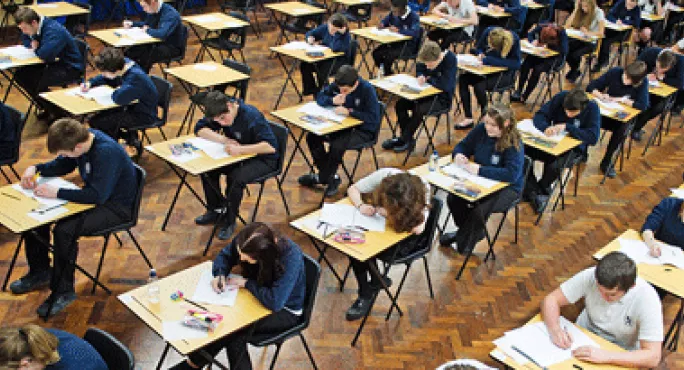- Home
- GCSEs 2021: More exam material may be shown in advance
GCSEs 2021: More exam material may be shown in advance

Material referred to in exam papers could be revealed in advance, according to headteachers close to the discussions on how GCSEs and A levels will go ahead in 2021 amid ongoing disruption to learning caused by the Covid crisis.
One of the options being considered for the 2021 exams is for students to see material from question papers in advance across subjects, although school leaders have cautioned that this will not completely level the playing field for students who have missed lots of time from school because of the coronavirus.
Exclusive: GCSEs 2021 mess unsolvable, says exam board
Coronavirus: Change GCSEs 2021, say students ‘drowning in anxiety’
Exclusive: Would regional GCSE grades be fair?
Exams: Ofqual looking at multiple choice and mocks
Geoff Barton, general secretary of the Association of School and College Leaders, said: “One idea being discussed is the use of pre-release material for students. This isn’t a new idea.
“Earlier in the summer, Ofqual has signalled some specific approaches - eg, in English literature you could have students taking in extracts rather than needing to memorise quotations, or using data sheets in maths.
“The question is how far that can be taken in other subjects, as it often was in previous versions of exams - for example, being presented with source material or a case study taught in class, then being asked questions on that source material in the actual exam,” Mr Barton added.
He told Tes that “giving advance notice of the topics in exam papers could help address the disruption caused by Covid to a certain extent because it would guide teachers and students on where to place their focus in the time available,” but cautioned that “it does not address the central problem of the high degree of variability in learning experiences between students”.
“Those whose learning has been heavily disrupted will be further disadvantaged in comparison to those whose learning has been less disrupted, and it will not be a level playing field,” he said.
“Small changes to exams won’t in themselves be enough to create a sense of fairness. You would need to have a whole suite of options,” he said.
“There’s plenty of research that will tell you that the more optionality you introduce, the more it advantages more able students, because they cope with it much better,” he said.
“Whereas less able students find it more of a struggle. So actually, you may be cutting off your nose to spite your face.”
Mr Barton added that in subjects such as geography, pre-release material might involve pupils working through a case study with their teacher prior to the exam, or analysing a particular source for history.
He also told Tes that the idea of “optionality” - greater choice within question papers - announced by Glenys Stacey earlier this year was now generally seen as “problematic” once you start looking at the logistical complexities it creates within examination papers.
“I think the logistics of optionality are being seen as problematic,” he said. “I think there’s widespread recognition of how even the logistics of creating exam papers where pupils could choose particular questions are very difficult, so I suspect that is being ruled out.
“I think the whole concept of optionality is lower down the pecking order than it was previously, not least because it risks further disadvantaging disadvantaged students.”
His comments follow those from Colin Hughes, chief executive of AQA, who told Tes that the idea of “optionality” could create more unfairness within the system.
Alison Peacock, chief executive of the Chartered College of Teaching, said teacher assessment should be included as part of the process in 2021, adding: “By reducing the number of subjects to be examined, there are those who have had full attendance and brilliant teaching through the year who would be able to hone their thinking around those subject areas, and there would be others who would just be about able to cover what they needed to, so it’s still unfair, but that’s because it’s an unfair situation.”
However, she added: “To not do that you’ve still got the uneven playing field and all the students have got to try and cover all of the syllabus, so at least reducing it you’ve got less of a challenge in making a fair fist of going into that exam hall if you’ve had a lot of absence. But if you’re up against someone who’s been able to access learning full-time without disruption, then clearly they have an advantage because they’ve had the breadth of study.”
The government is expected to announce final plans for the 2021 exam series by the end of the month.
The Department for Education has been contacted for comment.
Register with Tes and you can read two free articles every month plus you'll have access to our range of award-winning newsletters.
Keep reading with our special offer!
You’ve reached your limit of free articles this month.
- Unlimited access to all Tes magazine content
- Save your favourite articles and gift them to your colleagues
- Exclusive subscriber-only stories
- Over 200,000 archived articles
- Unlimited access to all Tes magazine content
- Save your favourite articles and gift them to your colleagues
- Exclusive subscriber-only stories
- Over 200,000 archived articles



